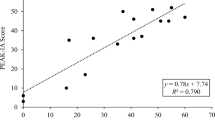Abstract
With the rising number of individuals diagnosed with autism and other developmental disabilities comes an increased need for effective assessment and treatment options. Previous research has indicated that applied behavior analytic techniques are among the most empirically supported and utilized treatments for this population; however, curriculum and assessment tools rooted in utilizing these techniques have very little empirical support for their reliability and validity. The current studies sought to assess the performance of both a normative sample and a sample with autism on one such assessment tool: The PEAK Generalization Module. Altogether, 183 typically developing children participated in study 1 and 84 children with a diagnosis of autism participated in study 2. The results indicated that the normative sample demonstrated a strong positive correlation between the PEAK Generalization Assessment and age, whereas the sample with autism demonstrated no significant relationship between the two. Further analysis indicates that the PEAK Generalization Assessment may be an appropriate tool for assessing individuals with autism across a wide range of ages, and provides a preliminary benchmark against which to measure both current functioning and progress in individuals with developmental disabilities.





Similar content being viewed by others
References
Baer, D. M., Wolf, M. M., & Risley, T. R. (1968). Some current dimension of applied behavior analysis. Journal of Applied Behavior Analysis, 1(1), 91–97.
Bailey, J. S., & Burch, M. R. (2002). Research methods in applied behavior analysis. Beverly Hills: Sage.
Chandler, L. K., Lubeck, R. C., & Fowler, S. A. (1992). Generalization and maintenance of preschool children’s social skills: A critical review and analysis. Journal of Applied Behavior Analysis, 25(2), 415–428.
Cooper, J. O., Heron, T. E., & Heward, W. L. (2007). Applied Behavior analysis (2nd ed.). Upper Saddle River, NJ: Pearson Prentice Hall.
Dixon, M. R. (2014a). The PEAK relational training system: Direct training module. Carbondale, IL: Shawnee Scientific Press.
Dixon, M. R. (2014b). The PEAK relational training system: Generalization module. Carbondale, IL: Shawnee Scientific Press.
Dixon, M. R. (2015). The PEAK relational training system: Equivalence module. Carbondale, IL: Shawnee Scientific Press.
Dixon, M. R., Belisle, J., Stanley, C., Rowsey, K. E., Daar, J. H., & Szekely, S. (2014a). Toward a behavior analysis of complex language for children with autism: Evaluating the relationship between the PEAK and the VB-Mapp. Journal of Developmental and Physical Disabilities, 21(2), 223–233.
Dixon, M. R., Belisle, J., Whiting, S. W., & Rowsey, K. E. (2014b). Normative sample of the PEAK relational training system: Direct training module and subsequent comparisons to individuals with autism. Research in Autism Spectrum Disorders, 8, 1597–1606.
Dixon, M. R., Carman, J., Tyler, P. A., Whiting, S. W., Enoch, M. R., & Daar, J. H. (2014c). PEAK relational training system for children with autism and developmental disabilities: Correlations with Peabody Picture Vocabulary Test and assessment reliability. Journal of Developmental and Physical Disability, 26(5), 603–614.
Dixon, M. R., Whiting, S. W., Rowsey, K. E., & Belisle, J. (2014d). Assessing the relationship between intelligence and the PEAK relational training system. Research in Autism Spectrum Disorders, 8, 1208–1213.
Foxx, R. M. (2008). Applied behavior analysis treatment of autism: The state of the art. Child and Adolescent Psychiatric Clinics of North America, 17(4), 821–834.
Gould, E., Dixon, D. R., Najdowski, A. C., Smith, M. N., & Tarbox, J. (2011). A review of assessments for determining the content of early intensive behavioral intervention programs for autism spectrum disorders. Research in Autism Spectrum Disorders, 5(3), 990–1002.
Gregory, R. J. (2011). Psychological testing: History, principles, and applications (6th ed.). Boston, MA: Pearson Education Inc.
Hayes, S. C., Barnes-Holmes, D., & Roche, B. (Eds.). (2001). Relational frame theory: A post-Skinnerian account of human language and cognition. New York: Plenum Press.
Lovaas, O. I. (1987). Behavioral treatment and normal education and intellectual functioning in young autistic children. Journal of Consulting and Clinical Psychology, 55(1), 3–9.
McKeel, A. N., Dixon, M. R., Daar, J. H., Rowsey, K. E., & Szekely, S. (2015a). Evaluating the efficacy of the PEAK relational training system using a randomized controlled trial of children with autism. Journal of Behavioral Education, 24(2), 230–241.
McKeel, A. N., Dixon, M. R., Rowsey, K. E., & Daar, J. H. (2015b). Correlation between PEAK relational training system and one-word picture vocabulary tests. Research in Autism Spectrum Disorders, 12, 34–39.
McKeel, A. N., Rowsey, K. E., Belisle, J., Dixon, M. R., & Szekely, S. (2015c). Teaching complex verbal operants using the PEAK relational training system. Behavior Analysis in Practice, 8, 241–244.
National Autism Center. (2009). National standards report. Retrieved from http://www.nationalautismcenter.org/pdf/NAC%20Standards%20Report.pdf.
Rowsey, K. E., Belisle, J., & Dixon, M. R. (2014). Principal component analysis of the PEAK relational training system. Journal of Developmental and Physical Disabilities, 27(1), 15–23.
Sidman, M. (1971). Reading and auditory-visual equivalence. Journal of Speech, Language, and Hearing Research, 14(1), 5–13.
Skinner, B. F. (1957). Verbal behavior. New York: Appleton.
Sundberg, M. L. (2008). Verbal behavior milestones assessment and placement program: The VB-MAPP. Concord, CA: AVBPress.
Walker, H. M., & Hops, H. (1976). Use of normative peer data as a standard for evaluating classroom treatment effects. Journal of Applied Behavior Analysis, 9(20), 159–168.
Wingate, M., Kirby, R. S., Pettygrove, S., Cunniff, C., Schulz, E., Ghosh, T., et al. (2014). Prevalence of autism spectrum disorder among children aged 8 years—Autism and developmental disabilities monitoring network, 11 sites, United States, 2010. MMWR Surveillance Summaries, 63(2), 1–21.
Author information
Authors and Affiliations
Corresponding author
Ethics declarations
Conflict of interest
Mark R. Dixon receives royalties from the sales of the PEAK curriculum. All remaining authors declare that he/she has no conflict of interest.
Ethical Approval
All procedures performed in studies involving human participants were in accordance with the ethical standards of the Institutional and/or National Research Committee and with the 1964 Declaration of Helsinki and its later amendments or comparable ethical standards.
Informed Consent
Informed consent was obtained from all individual participants/guardians who were included in the study.
Rights and permissions
About this article
Cite this article
Dixon, M.R., Rowsey, K.E., Gunnarsson, K.F. et al. Normative Sample of the PEAK Relational Training System: Generalization Module with Comparison to Individuals with Autism. J Behav Educ 26, 101–122 (2017). https://doi.org/10.1007/s10864-016-9261-4
Published:
Issue Date:
DOI: https://doi.org/10.1007/s10864-016-9261-4




